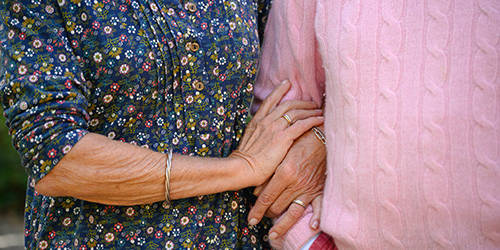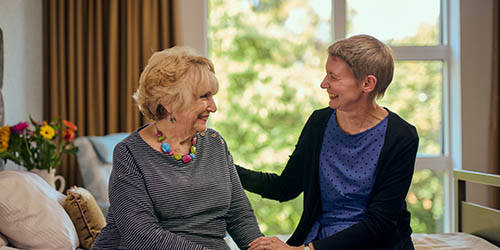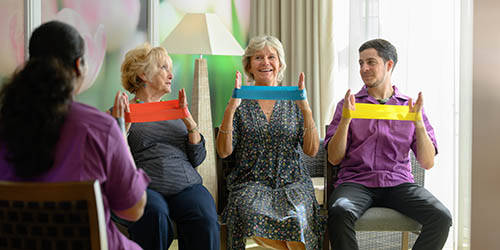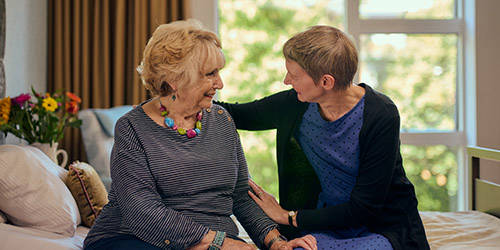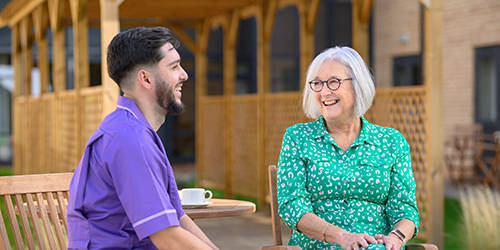- Home
- Guides & support
- Preparing for full time care with a respite break
Last updated 22 September 2025
Preparing for full time care with a respite break
When choosing a care home for long term residential care, it’s often the case that a person who has visited a care home for a respite stay will return to the same home, find the move easier and settle in more quickly.
Below we take a look at the range of ways respite breaks and short stays in a care home environment can help prepare new residents and their carers for the transition to full time residential care.
 Familiar surroundings
Familiar surroundings
For many, the move from home care to permanent residential care can be an uncertain and stressful time: a care home is a new and likely much bigger environment than most people are used to. Respite care provides people with a valuable chance to learn the layout of the home, gain a sense of its environment and begin to recognise friendly faces. Gaining experience of respite care and being familiar with mealtimes and recreational activities can be positive steps towards making a care environment feel like home.
Building a routine
We are creatures of habit and when we live in the same house for a long time we create daily routines for ourselves; for many people, these are very important to retain.
At Anchor we find that a respite stay in one of our care homes allows visitors to see not only the commitment of our carers to sustaining the daily lives that they already enjoy, but also how our teams and care home’s facilities can enrich their lifestyle further, allowing visitors to partake in pastimes or social events that may have previously been difficult or impossible for them to access.
Incorporating everything from singing, to games and arts and crafts, every Anchor care home provides a rich and varied activities programmes. Activities run alongside themed events and special occasions, such as bringing therapy animals into a home, or hosting cocktail evenings and live music to take residents and visitors down memory lane.
This approach also extends to mealtimes and dining. All the colleagues in our care homes are committed to making mealtimes a sociable and enjoyable part of each day: living independently, people can miss eating with others, and a respite stay is a perfect way of demonstrating the sense of community that comes with residential care.
 We recognise that everybody’s culinary palates are unique and our care home catering teams celebrate these differences by ensuring every mealtime caters to every taste, there are always an array of delicious snacks and drinks available throughout the day, and residents are in control of their food choices. In our care homes we get to know residents’ favourite dishes and prepare freshly cooked, appetising and nutritionally balanced meals, with plenty of choice, every day.
We recognise that everybody’s culinary palates are unique and our care home catering teams celebrate these differences by ensuring every mealtime caters to every taste, there are always an array of delicious snacks and drinks available throughout the day, and residents are in control of their food choices. In our care homes we get to know residents’ favourite dishes and prepare freshly cooked, appetising and nutritionally balanced meals, with plenty of choice, every day.
Creating relationships
Every Anchor care home is a vibrant and dynamic community, and making each new resident feel fully at home, quickly, is our priority.
A respite stay can allow new residents to move to the home with some pre-existing friendships, which greatly helps their transition into residential care.
It’s equally reassuring for residents to move to a care home and already know some of the colleagues on hand, from the carers and catering team, to visiting medical professionals and beauty technicians. Knowing the people you will be spending your time with and who will be supporting and caring for you, takes away much of the doubt and uncertainty from the move.
Helping loved ones know what to expect from a respite care break
We've written a short guide looking at some of the most important aspects of a respite stay at an Anchor care home which you can share you your loved ones.
Read more about what to expect during a respite stay at an Anchor care home here.
Making it easier for carers
Looking after a person for a long time can make their transition into residential care a difficult and emotional time for a carer. Placing your loved one in the care of other people after dedicating yourself to supporting them round the clock can be a very hard decision.
Respite care can provide an opportunity for carers and their loved one to spend short periods of time away from each other, secure in the knowledge that the distance and separation are only temporary. This can afford a carer some valuable time to themselves, to manage their own long-term well-being, adjust to a new routine and learn to lean on other people for support.
We've created a free guide to respite care for carers to help answer some common questions.
When residential care becomes an important matter to consider, a previous respite stay will mean that carers and residents alike have a good sense of a care home’s daily life and have formed relationships with the colleagues; both parties will know what to expect and this can remove a lot of the stress and uncertainty that comes with the decision.
Guides on making decisions and moving to a care home
This website uses cookies which track activity so that you get the best possible experience. By continuing to use this website we will assume you are happy and cookies will be set. You can change your cookie settings at any time.



